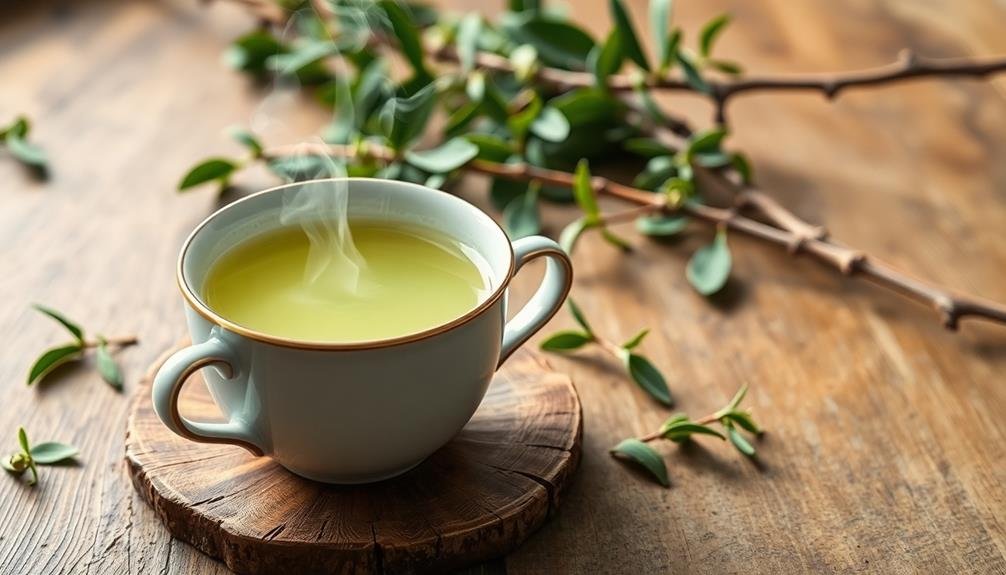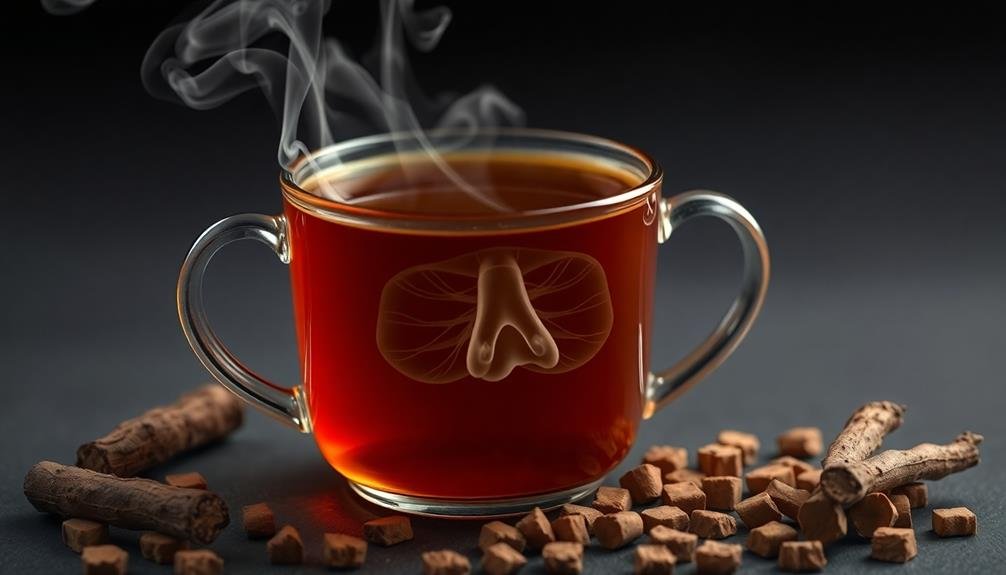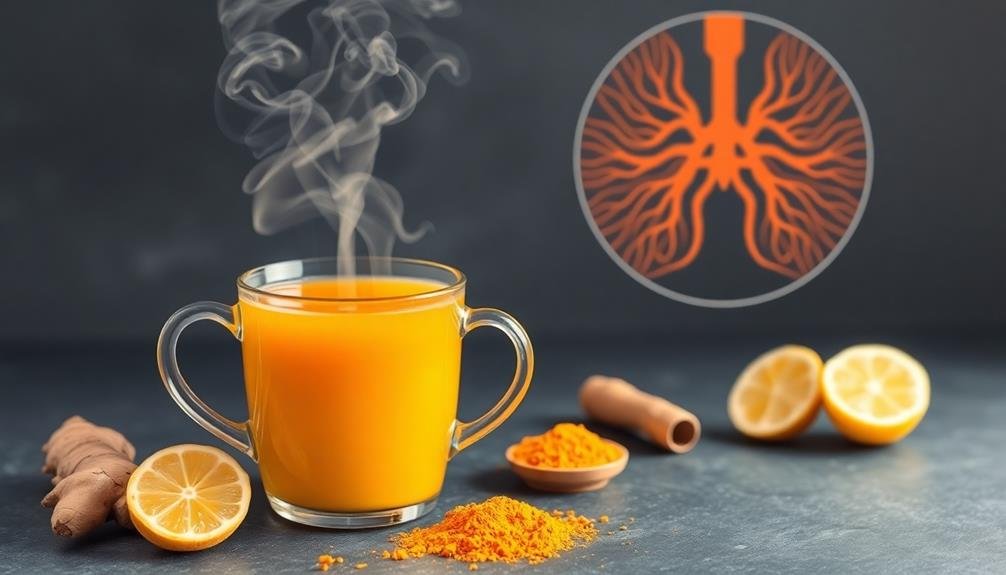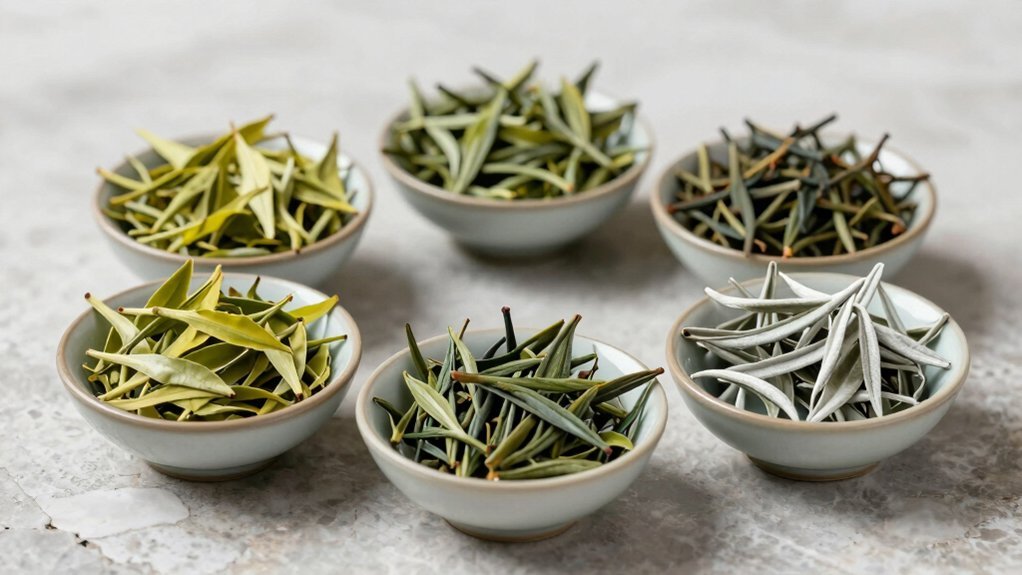Several herbal teas can naturally combat sinus infections, providing relief from congestion and inflammation. Peppermint tea's menthol acts as a decongestant, while ginger tea reduces inflammation and boosts immunity. Eucalyptus tea helps clear nasal passages, and chamomile soothes irritated sinuses. Elderberry tea strengthens your immune system, while licorice root thins mucus for easier expulsion. Green tea's antioxidants fight pathogens, turmeric reduces swelling, and echinacea enhances immune response. You can steep these teas for 5-10 minutes and drink 2-3 cups daily during infections. Remember to inhale the steam for added benefits. Exploring these natural remedies further could reveal even more ways to ease your sinus discomfort.
Peppermint Tea for Sinus Relief

Peppermint tea is a sinus-clearing powerhouse that can provide quick relief from congestion and discomfort. When you're battling a sinus infection, this aromatic brew can be your natural ally. The menthol in peppermint acts as a decongestant, helping to break up mucus and open your nasal passages.
To harness its benefits, steep a peppermint tea bag or fresh leaves in hot water for 5-7 minutes. As you sip, inhale the steam to maximize the tea's sinus-clearing effects. The warmth of the liquid will soothe your throat and help thin mucus, making it easier to expel.
Peppermint tea also boasts anti-inflammatory properties that can reduce swelling in your nasal passages. This may alleviate pressure and pain associated with sinus infections.
For an extra boost, add a squeeze of lemon to your tea. The vitamin C in lemon can support your immune system, potentially speeding up recovery.
Drink peppermint tea 2-3 times daily during a sinus infection for best results. You can also use it preventatively when you feel congestion coming on.
Ginger Tea's Decongestant Properties
While peppermint tea offers powerful relief, ginger tea is another potent ally in the fight against sinus infections. Ginger's natural decongestant properties can help clear your nasal passages and reduce inflammation in your sinuses.
When you brew ginger tea, you're tapping into its active compounds, including gingerols and shogaols, which have powerful anti-inflammatory effects.
To make ginger tea, steep fresh ginger slices or ginger powder in hot water for about 10 minutes. You'll benefit from its warming sensation, which can help thin mucus and promote drainage.
Ginger tea also boosts your immune system, helping your body fight off the infection more effectively.
For added relief, inhale the steam from your ginger tea. This can help moisturize your nasal passages and loosen congestion. You can enhance the decongestant effects by adding a drop of eucalyptus oil to your tea.
Drink ginger tea 2-3 times a day during a sinus infection for maximum benefits. Remember, while ginger tea is generally safe, it's best to consult your doctor if symptoms persist or worsen.
Eucalyptus Tea for Breathing Easy

Breathe easier with the powerful benefits of eucalyptus tea. This aromatic brew contains eucalyptol, a compound known for its ability to clear nasal passages and relieve sinus pressure.
When you sip eucalyptus tea, you're inhaling steam infused with its essential oils, which can help break up mucus and reduce inflammation in your sinuses.
To prepare eucalyptus tea, steep dried eucalyptus leaves in hot water for 5-10 minutes. You can also add a few drops of eucalyptus essential oil to your regular tea for a similar effect. As you drink, take deep breaths to maximize the decongestant properties of the steam.
Eucalyptus tea isn't just for sipping; you can also use it for a steam inhalation treatment. Pour the hot tea into a bowl, drape a towel over your head, and breathe in the steam for 5-10 minutes. This concentrated exposure can provide quick relief from sinus congestion.
While eucalyptus tea is generally safe, it's potent. Don't consume it in large quantities, and avoid it if you're pregnant or have certain medical conditions.
Always consult your healthcare provider before using herbal remedies for sinus infections.
Chamomile Tea's Anti-Inflammatory Effects
A soothing cup of chamomile tea can be your ally in fighting sinus inflammation. This herbal remedy has been used for centuries to combat various ailments, including sinus infections. Chamomile's anti-inflammatory properties stem from its active compounds, particularly chamazulene and apigenin.
When you drink chamomile tea, these compounds work to reduce inflammation in your nasal passages and sinuses. This can help alleviate pressure, pain, and congestion associated with sinus infections.
Additionally, chamomile's mild sedative effects can promote relaxation and better sleep, which is vital for your body's healing process.
To maximize chamomile's benefits, steep the tea for 5-10 minutes and inhale the steam while it's brewing. This allows the tea's vapors to directly reach your nasal passages, providing immediate relief.
You can also apply cooled chamomile tea bags to your eyes and forehead to reduce sinus-related swelling and discomfort.
While chamomile tea isn't a cure-all for sinus infections, it's a natural, safe option to complement other treatments. Drink 2-3 cups daily during a sinus infection to support your body's healing process and enjoy its soothing effects.
Elderberry Tea Boosts Immunity

Elderberry tea can be a powerful ally in your fight against sinus infections. Its antiviral properties help combat the pathogens responsible for your discomfort, while its rich antioxidant content strengthens your immune system.
You'll benefit from drinking elderberry tea regularly during cold and flu season to bolster your body's natural defenses.
Antiviral Properties
Many herbal teas offer antiviral properties, but elderberry tea stands out for its powerful immune-boosting effects. This dark purple berry contains compounds that can inhibit viral replication, making it an excellent choice for combating sinus infections.
When you drink elderberry tea, you're ingesting flavonoids and anthocyanins, which have been shown to reduce inflammation and fight off harmful pathogens. These antioxidants help strengthen your immune system, enabling your body to ward off viruses more effectively.
Research suggests that elderberry extract can shorten the duration of flu-like symptoms by up to four days. It's particularly effective against certain strains of influenza, which can often lead to sinus infections. By drinking elderberry tea regularly, you're providing your body with a natural defense against these viral invaders.
The antiviral properties of elderberry tea don't just stop at preventing infections. They can also help alleviate symptoms if you're already suffering from a sinus infection.
The tea's ability to reduce inflammation can help clear congested nasal passages, making it easier for you to breathe and recover more quickly.
Rich in Antioxidants
Beyond its antiviral properties, elderberry tea packs a powerful antioxidant punch. This dark purple berry is bursting with flavonoids, particularly anthocyanins, which give it its rich color and potent health benefits. When you're battling a sinus infection, these antioxidants can help reduce inflammation and boost your immune system.
Elderberry tea's high antioxidant content offers several advantages:
- Fights free radicals
- Reduces oxidative stress
- Supports overall cellular health
- Enhances your body's natural defense mechanisms
By drinking elderberry tea regularly during a sinus infection, you're providing your body with a steady supply of these beneficial compounds. They work to neutralize harmful free radicals, which can damage cells and weaken your immune response.
This antioxidant support is essential when your body is fighting off an infection, as it helps maintain the strength of your immune system and promotes faster healing.
Additionally, the antioxidants in elderberry tea may help alleviate some of the uncomfortable symptoms associated with sinus infections, such as congestion and facial pain. By reducing inflammation in your nasal passages and sinuses, you might find relief from these bothersome symptoms more quickly.
Thyme Tea Fights Infections
Thyme tea stands out as a potent ally in the fight against sinus infections. It's packed with antimicrobial and antifungal properties that can help combat the bacteria and fungi responsible for your sinus woes. When you brew thyme tea, you're harnessing the power of thymol, a compound known for its ability to break up mucus and reduce inflammation in your nasal passages.
To make thyme tea, steep 1-2 teaspoons of dried thyme in hot water for 10-15 minutes. You can add honey for sweetness and an extra antibacterial boost. Drink this tea 2-3 times daily to experience its full benefits.
Here's a quick overview of thyme tea's benefits for sinus infections:
| Benefit | How it Helps | Frequency |
|---|---|---|
| Antimicrobial | Fights bacteria | Daily |
| Antifungal | Combats fungi | Daily |
| Expectorant | Breaks up mucus | As needed |
Licorice Root Tea Soothes Sinuses

With its sweet flavor and powerful healing properties, licorice root tea offers soothing relief for inflamed sinuses. This herbal remedy contains glycyrrhizin, a compound that helps reduce inflammation and fights bacteria.
When you're suffering from a sinus infection, licorice root tea can help alleviate pain, decrease swelling, and promote faster healing.
To brew licorice root tea, steep 1-2 teaspoons of dried licorice root in hot water for 5-10 minutes. You can drink this tea up to three times a day for maximum benefits. However, it's essential to recognize that excessive consumption of licorice root may lead to side effects, so moderation is key.
Licorice root tea offers several benefits for sinus infections:
- Reduces inflammation in nasal passages
- Thins mucus, making it easier to expel
- Boosts your immune system
- Provides natural pain relief
If you're prone to sinus infections, consider adding licorice root tea to your natural remedy arsenal.
It's an effective, tasty way to support your body's healing process and find relief from uncomfortable sinus symptoms.
Remember to consult your healthcare provider before incorporating any new herbal remedies into your routine, especially if you have underlying health conditions or take medications.
Green Tea's Antioxidant Power
Green tea's powerful antioxidants can be a game-changer for your sinus infection.
The catechins in green tea fight inflammation, while EGCG, a potent compound, boosts your immune system to help combat the infection.
Additionally, green tea's antimicrobial properties may directly target the bacteria or viruses causing your sinus issues.
Catechins Fight Inflammation
Powerhouses of antioxidants, catechins in green tea can be your allies in fighting sinus inflammation. These potent compounds work to reduce swelling and irritation in your nasal passages, potentially easing the discomfort of sinus infections.
When you drink green tea, you're introducing a natural anti-inflammatory agent into your system, which can help combat the root cause of your sinus issues.
Catechins, particularly epigallocatechin gallate (EGCG), have been shown to inhibit the production of inflammatory molecules in the body. This action can lead to:
- Reduced mucus production
- Decreased nasal congestion
- Improved sinus drainage
- Enhanced immune response
EGCG Boosts Immunity
Epigallocatechin gallate (EGCG), the star antioxidant in green tea, doesn't just fight inflammation—it's also a powerful immune booster. This compound enhances your body's defense mechanisms, helping you ward off sinus infections and other illnesses.
EGCG stimulates the production of T-cells, crucial components of your immune system that identify and destroy harmful pathogens. It also increases the activity of natural killer cells, which target virus-infected cells and tumor cells. By drinking green tea regularly, you're fundamentally giving your immune system a daily workout.
Furthermore, EGCG has been shown to inhibit the growth of various bacteria and viruses. This property is particularly beneficial when combating sinus infections, as it can help prevent the overgrowth of harmful microorganisms in your nasal passages.
To maximize the immune-boosting benefits of EGCG, aim to drink 3-5 cups of green tea daily. For sinus infections, consider using green tea as a base for steam inhalation. Simply brew a strong cup, pour it into a bowl, and inhale the steam with a towel draped over your head. This method delivers EGCG directly to your nasal passages, providing localized immune support.
Antimicrobial Properties
Numerous studies have shown that green tea's antioxidants possess powerful antimicrobial properties. These compounds, particularly catechins like EGCG, can help combat various pathogens that cause sinus infections. When you drink green tea, you're not just enjoying a soothing beverage; you're also arming your body with natural defenders against harmful microbes.
Green tea's antimicrobial effects work in several ways:
- Inhibiting bacterial growth
- Disrupting bacterial cell membranes
- Interfering with bacterial communication
- Enhancing your immune system's response
By regularly consuming green tea, you're supporting your body's ability to fight off sinus infections naturally. The tea's compounds can help reduce inflammation in your nasal passages and sinuses, making it harder for bacteria to thrive.
Additionally, green tea's antioxidants can neutralize free radicals, which may contribute to sinus irritation and inflammation.
While green tea isn't a substitute for medical treatment, it can be a valuable addition to your sinus health regimen. Its antimicrobial properties, combined with its overall health benefits, make it an excellent choice for those looking to support their immune system and potentially reduce the frequency and severity of sinus infections.
Turmeric Tea Reduces Inflammation

Golden and aromatic, turmeric tea packs a powerful punch against sinus inflammation. This spice-infused beverage contains curcumin, a potent anti-inflammatory compound that can help alleviate the swelling and discomfort associated with sinus infections.
When you drink turmeric tea, you're introducing curcumin into your system, which works to inhibit inflammatory enzymes and reduce the production of inflammatory molecules. This action can help shrink swollen nasal passages, making it easier for you to breathe and allowing mucus to drain more effectively.
To prepare turmeric tea, you'll need to steep fresh or powdered turmeric in hot water for about 10 minutes. Adding a pinch of black pepper can enhance curcumin absorption by up to 2000%. For ideal results, aim to consume 2-3 cups of turmeric tea daily during a sinus infection.
It's important to note that while turmeric tea can provide relief, it shouldn't replace medical treatment for severe or persistent sinus infections. If your symptoms worsen or don't improve after a few days, consult your healthcare provider.
Additionally, if you're on blood thinners or have gallbladder issues, check with your doctor before incorporating turmeric tea into your routine.
Echinacea Tea Strengthens Immune System
While turmeric tea tackles inflammation, echinacea tea boosts your body's defense mechanisms. This powerful herb has been used for centuries to strengthen the immune system and fight off various infections, including those affecting the sinuses.
Echinacea works by stimulating the production of white blood cells, which are essential for combating harmful bacteria and viruses. When you're battling a sinus infection, drinking echinacea tea can help your body mount a stronger defense against the invading pathogens.
To make echinacea tea, steep 1-2 teaspoons of dried echinacea root or leaves in hot water for 10-15 minutes. You can drink this tea up to three times a day during a sinus infection. For maximum benefits, consider combining echinacea with other immune-boosting herbs like elderberry or ginger.
Here are four key benefits of echinacea tea for sinus infections:
- Enhances immune cell activity
- Reduces inflammation in the nasal passages
- Shortens the duration of symptoms
- Helps prevent future infections
Remember to consult with your healthcare provider before using echinacea, especially if you have allergies or are taking medications.
While generally safe, some people may experience mild side effects like nausea or dizziness.
Frequently Asked Questions
Can Herbal Teas Replace Prescribed Medications for Sinus Infections?
You shouldn't replace prescribed medications with herbal teas for sinus infections. While teas can offer some relief, they're not a substitute for medical treatment. Always consult your doctor before changing your approach to managing sinus infections.
How Often Should I Drink Herbal Teas for Sinus Relief?
You should drink herbal teas for sinus relief 2-3 times daily. Start with a cup in the morning, another in the afternoon, and one before bed. Adjust based on your symptoms and how you're feeling.
Are There Any Side Effects of Drinking These Herbal Teas Regularly?
While herbal teas are generally safe, you might experience mild side effects like upset stomach or allergic reactions. Don't overdo it, as some herbs can interact with medications. Always consult your doctor if you're pregnant or have health concerns.
Can I Combine Different Herbal Teas for Enhanced Sinus Infection Relief?
You can combine different herbal teas for enhanced sinus relief. Try mixing peppermint with ginger or chamomile with echinacea. These blends can offer complementary benefits, but don't overdo it. Stick to 2-3 types per blend for best results.
Are These Herbal Teas Safe for Pregnant Women or Children?
You should consult your doctor before using herbal teas if you're pregnant or giving them to children. Some herbs can be unsafe during pregnancy or for young ones. It's always best to err on the side of caution.
In Summary
You've now got a powerful arsenal of natural remedies to fight sinus infections. From peppermint to echinacea, these herbal teas offer various benefits to ease your symptoms and boost your immune system. Don't hesitate to experiment and find the blend that works best for you. Remember, while these teas can provide relief, they're not a substitute for medical advice. If your symptoms persist, it's always best to consult your healthcare provider.





Leave a Reply